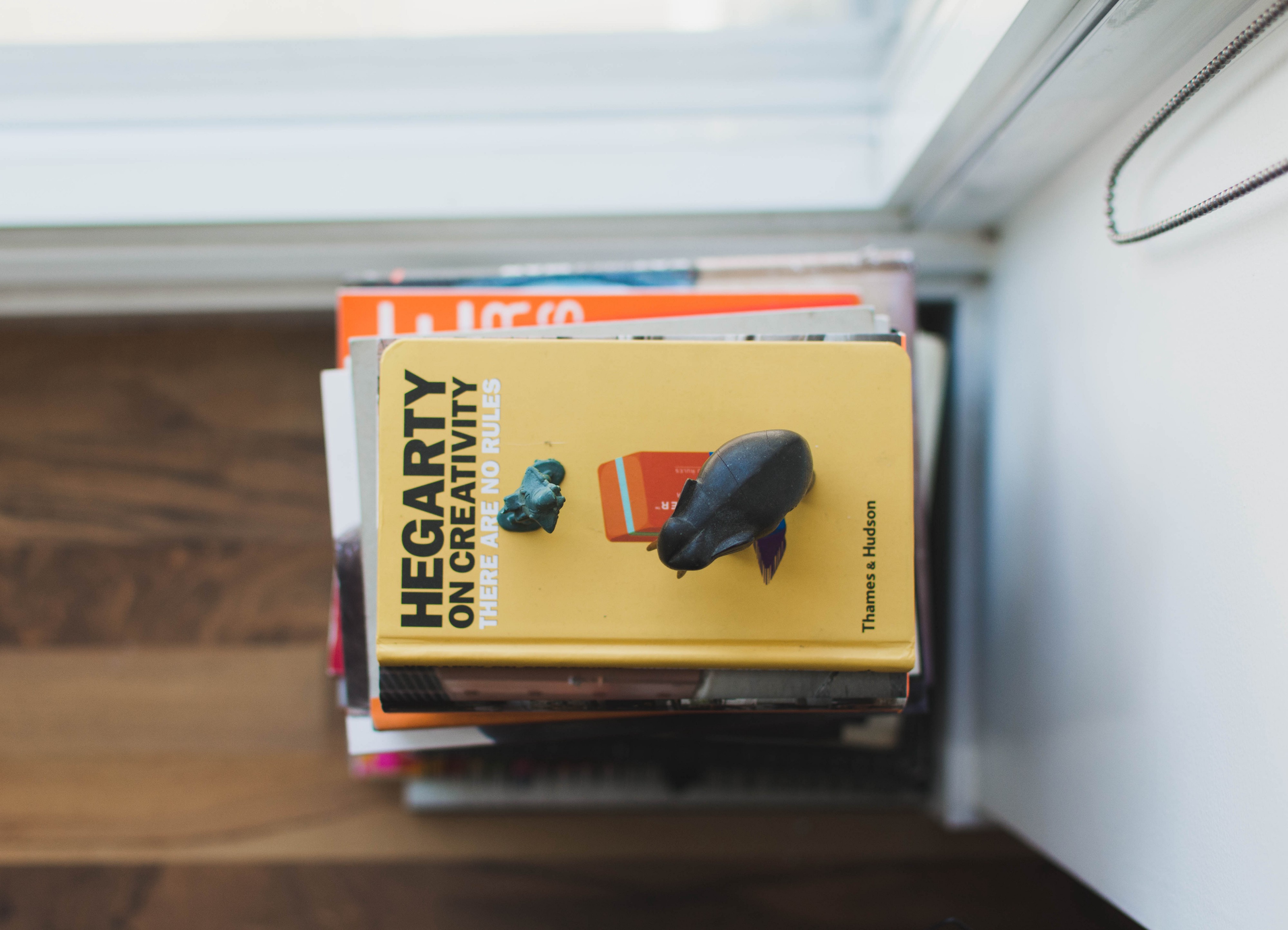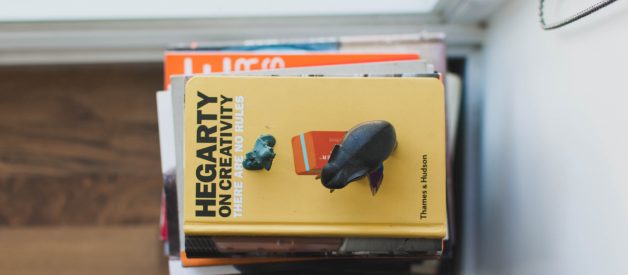What I learned and lost from reading in 2019.
 Photo by Nick Hillier on Unsplash
Photo by Nick Hillier on Unsplash
As I turned the last page and closed the back cover, I looked up and took a deep breath in, slowly exhaling. Book number 100, ?Measure What Matters ?by John Doerr, which seemed fitting considering the moment.
The day was December 3rd, which meant I had finished my biggest goal of 2019 with 28 days to spare. I logged the book and author on my various lists and Goodreads account. I jotted down some notes on my Evernote where I was following along with my top takeaways from the book.
Then I set it aside and picked up my next book.
Making Books a Staple Part of My Diet
I started 2019 by committing with a friend to reading five books in the month of January. It was like a condensed book club.
To kick off the new year, we picked the same five books to read, purposefully picking one book from five different categories: a non-fiction, a self-help, a science fiction, a more classic fiction, and a spiritual book. (This didn?t include my audiobook consumption, which I really started to ramp up towards the end of 2018.)
After some back and forth we landed on:
- Non-Fiction: ?A Moveable Feast ? by Ernest Hemmingway
- Self-Help: ?The Magic Art of Tidying Up? by Marie Kondo
- Science Fiction: ?Hitchhiker?s Guide to the Galaxy? by Douglass Adams
- Classic Fiction: ?Breakfast of Champions? by Kurt Vonnegut
- Spiritual: ?Soul Keeping? by Jon Ortberg
At the time, the pace and sheer volume of reading seemed insurmountable. Until that point, I hadn?t read five books in a month since I was a kid reading young adult books. I had managed to read 32 books in 2018, a number I was proud of. And yet, in the first month of 2019, I was attempting to knock off almost 15% of my previous year?s total.
By the time February 1st rolled around, I had actually read seven books in January and had listened to four more. I was shocked. But this was just one month, right? There was no way I could keep up this pace for the entire year. My brain felt overworked and stretched like it couldn?t retain one more fact or well-written sentence. ?But,? I thought, ?why not give it a shot??
What if I could read four to five books a month while listening to a few more? I set my Goodreads goal to 60 books in 2019.
Five months later, I was 50 books in.
I upped my goal to 72, then 80. Then finally, I just called it what it was. I was going for 100. What had seemed impossible at the start of 2019 was now potentially a reality. A few months and many books later, I hit that goal.
Throughout the year, I started having more and more conversations about what I was reading. The top question I kept getting asked and kept thinking about was: ?Is reading this much really helpful?? Or in other words, ?Does it make you any smarter??
In my own experience, I?ve found that the answer to that is, ?maybe.? Here?s what I mean.
Why Read At All?
Perched on a bookshelf are a hundred worlds, a thousand people ? some of whom are just like you or just like me. Along those shelves sit enemies and triumphs, plots, examples of valour and bravery that spur admiration, and moments of cowardice that makes you want to snarl.
Amongst these pages, you can discover how love works, what loyalty means, why adventure is so inviting, and how tension and suspense can shake you down to your bones. You can gain understanding, wisdom, sympathy, and empathy, all through those little black words printed on slightly off-white paper.
You can visit places you?ve never been to before. You can travel in time, to the past and to the future. You can learn from mistakes made as you attempt to avoid your own. Sitting on that shelf are jokes waiting to be heard, laughter waiting to be discovered. And beauty. So much beauty.
There is beauty in the way that words fit together. In the way that a sentence can change your entire perspective, shift a country into war, or birth a new nation. There is beauty in the way a father describes holding his child for the first time, or a young teenager describes her first love. There is beauty in the discovery of a passion, in the mourning of a dream, in the meticulous mastery of making vivid that which the eyes have unknowingly learned to glaze over and take for granted.
Why do we read? For the same reasons we sing. The same reason we dance. The same reason we listen with rapt attention when a great story is being told.
We read because the act of getting lost in another?s world is, in some way, the process of discovering our own. Because the front cover of a book is really a doorway through which we find an expansion of our souls we always knew existed but never knew how to explain. We read because we do not yet understand ourselves perfectly and because we can always do with the benefit of having a few guiding voices.
May you find here a story that puts words around that which you already knew in your heart, but had not yet named.
4 Tips On How to Read More
Reading, like any skill, is something that needs to be practiced repeatedly in order to see improvement. If you are interested in reading more than you have before, you cannot use the same methods you have always done.
I?ve found that most people like the idea of being well-read, but fewer people actually want to put in the work of reading. It is hard work to be a great reader. I know what you?re thinking.
?Work? Yuck. Isn?t there a quote somewhere that says that if you love what you do, it?s not really work??
Well, yes. If you thought that then you?d be right. Mark Twain is often quoted for saying:
?Find a job you enjoy doing, and you will never have to work a day in your life.?
However, this needs a little context. This quote was likely written in the late 1800s, where hard, often manual work was unavoidable. This was in the full-swing of the Industrial Revolution and Twain likely wrote this sentiment in an effort to remind men and women so accustomed to hard work that there was great value to be had in enjoying the work at hand.
In our 21st century culture, which seems at times adverse to hard work, many people use this or similar quotes to justify the constant pursuit of happiness.
But here?s the deal. If you only want to be happy, becoming an avid reader may be tough. It takes hard, intentional work. That doesn?t make the venture any less lucrative. In fact, hard things are often the most lucrative once accomplished.
When I say that increasing your reading is hard work, I?m not talking about reading two or three more books than you did last year. I?m talking about doubling or tripling your reading year.
If that kind of growth is what you are after, here are four steps you can take to see your reading increase.
1. View Reading as a Hobby
This is less of a direct tip than it is a mindset shift. This view has been one of the most enlightening realizations for me for 2019. I love to ask people what their hobbies are because I think you can tell a lot about a person from what they are interested in outside of their 9?5 job. In a society where busy work is highly valued, I am always fascinated by what people choose to give their small precious amounts of free time to.
At its core, a good hobby is an activity that you are uniquely passionate about and something you individually pursue. Therefore, when someone asks what your hobbies are, if you don?t have an answer off the top of your head, it would make sense to start by thinking of what you spend the most time on when you are away from work.
If you spend 2?3 hours a night in front of the TV, catching up on the latest show or re-watching movies you?ve already seen, odds are that one of your top hobbies is watching TV. If you spend the majority of your off-hours logging miles and training, your hobby is likely long-distance running.
About halfway through 2019, I began to realize that when people asked me what my hobbies were, the things I spent the majority of my free time doing was reading and writing. Those were my hobbies this year.
Once I had this realization, I started to see the time I spent reading not as an obtrusion to what I was really wanting to do, but as an opportunity to exercise one of my primary hobbies. This simple shift started to re-frame my view
2. Start as Soon as You Finish
This is my favourite piece of advice to aspiring readers because it is incredibly simple and often overlooked. The hardest part of reading is starting, especially when you have a few books to choose from.
The book-starting paralysis is real and it will keep you from accomplishing your reading goals if you let it. But it can be beaten.
The trick to overcoming the paralysis of starting your next book is two-fold. First, by the time you get to the last chapter of your current book, you need to have your next book picked out. As a cowboy would say,
?You need to have one in the chamber.?
That way, you can move on to the second step, which is the million-dollar move. As soon as you finish your current book, you set it down, write it down in your notebook or wherever you are keeping track, and then you immediately pick up your next book and read the first 15 pages or the first chapter, whichever comes first.
Reading is all about momentum. A great story rarely starts on the first page, but once you get into a book, you?re much more likely to get hooked. Finishing and starting new books is like running a lap around a track, then stopping for a 30-minute break before you run another lap.
The rest can be helpful, but if you stop long enough, your muscles can get tight. It?s much easier to keep running if, after a lap, you slow down to a walk before starting back up.
3. Keep Anticipation High
I?ve found that when I have a book in my queue that I am really looking forward to reading, I often read more because I am anticipating what is coming up ahead. By itself, that anticipation may not be enough to propel your reading to new heights, but it can be a great tool to combine in your overall pursuit of increasing your reading goal.
Here are a few other ways I?ve learned to keep my anticipation high:
- Read multiple books at the same time. If you do this right, switching back and forth between the storylines can help keep things fresh.
- Pause reading a book right in the middle of a good or intense part. When you?re actively thinking about when you can get back to read your book, you know you?re in a good spot.
- Wait to read the final book of a series. People like to binge book series just as much as they like to binge TV shows. It?s just harder to do. Imagine reading the Harry Potter books for the first time and stopping on book 5 or 6, then reading something else? The anticipation of getting back to a series can be a great motivator.
- Read a book of one genre while listening to a book of another. I often find that when I?m reading a good fiction book, I like to be listening to a non-fiction. Or when I?m reading a handful of books for school, I like to have a lighthearted, fiction book queued up on audiobook.
4. Reading Is a Team Sport
For a long time, reading was viewed as an individual activity. And for good reason. For many growing up in the late 20th century, reading involved going to a small, dusty library, picking out a book, taking it home, and reading it alone or under the covers before lights out. The library was seen as a place of quiet reverence, where the sound, ?Shhhhhhhh,? was as common as an overactive lifeguard?s whistle at a public pool on a hot summer day.
For all of its positive benefits, the public library helped create the possibility of isolation within the book reading experience. Reading was hard to connect to other topics, and in order to get books, you had to go all the way back to the library and check something new out (if it was even there!). Many people still feel that effect today.
But fast forward now to 2020 and reading has become a team sport. You can download any variation of book to your smart reader and there are thousands of audiobooks at your disposal.
There are platforms like Goodreads which allow you to see what other people are reading as well as track your progress towards a certain goal.
If you want to see your reading increase, consider bringing other people into your journey. Join a book club, sign up for book recommendations from authors, or follow some Instagram accounts of avid readers to get suggestions and tips.
Reading for Comprehension
Let?s say you?re on board for increasing your reading. You?re up for taking some of these tips and working them into your daily rhythm in 2020. Will that make you smarter?
The simple answer is: No.
Reading 100 books in a year is an accomplishment. For most people, it will stretch their horizons and stretch their brain to its limit. But it won?t make you smarter unless what you read actually starts to impact the way that you live. Knowledge on its own puffs up.
Said another way, it doesn?t matter how many books you read if you don?t retain what you read. As soon as I say that, I know someone is squirming and saying, ?See, this is why I never read.?
Hold on.
Retention is not the same same thing as an eidetic or photographic memory. Retaining information does not mean that you are able to spout off every chapter title and the quote that was on page 164, word for word.
Retention means that the core idea of the book gets inside you. That you internalized the central message of the book and that you thought intentionally about how to put that message into practice in your own life.
Of course, this process looks different for fiction and non-fiction books ? from a story to a book on statistics. But even for a fiction book, you can retain aspects like how the story was told, the way the words made you feel during the love interest or adventure.
Here are a few tools I used this year that helped me ensure that I was retaining information from the books I read.
- Use a 3×5 lined notecard as your bookmark. Then use this bookmark to jot down ideas that stand out to you or key points from the book you are reading.
- Make an Evernote note for sections that you especially want to remember and dictate sentences and quotes directly into that note.
- Write about the books that you are reading. So many of my article ideas are inspired from a quote or an idea in a book I?m reading at the moment.
These are starting blocks, but you can make this process your own. Maybe you are in a book club and your practice of retention comes from the group discussion each month. Maybe you like to leave reviews for books online and that is the way you work to retain information.
Regardless, if you don?t make an effort to retain what you learn, you won?t be getting any smarter by reading
What I Lost From Reading 100 Books
There is a lot to be gained from reading 100 books in one year. I would encourage anyone to spend at least one year of their lives trying this goal.
But in concluding this article, I want to point out that working towards this metric wasn?t all gain. I lost some things along the way of reading 100 books.
I lost the time I spent reading that I could have been doing other things. I lost the occasional night of going to bed with my wife. I lost the chance to be caught up on all the TV shows or the most recent sports game.
I lost the chance to stay at the same level of ignorance. I lost the chance to say, ?I just didn?t know,? on a variety of topics I hadn?t read about previously.
Choosing to do something hard means facing some kind of loss along the way. But just because you lose something, that doesn?t mean you?re doing something wrong.
If the gains of your goal outweigh the loss you experience along the way, you?re likely on the right track.
Mind Cafe in Your Inbox
Want to stay up to date with our top-performing posts each week? Sign up for email updates by following this link.


